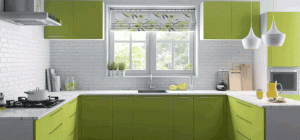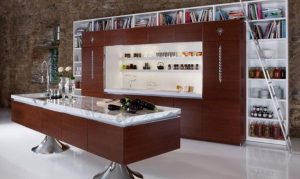Due to lingering macroeconomic concerns, the home improvement sector is witnessing a slowdown as buyers put off big purchases. However, the home improvement sector remains well-positioned for long-term growth due to growing disposable income, rising DIY projects, aging housing stock, continued shift to rural and suburban areas, etc.
In this piece, I evaluated two home improvement stocks, The Home Depot, Inc. (HD) and Newell Brands Inc. (NWL), to determine a better investment. I find HD a better pick for the reasons explained throughout this article.
Home improvement was one of the major themes during the pandemic as people were stuck indoors with significantly fewer avenues to spend their money on. Rising savings, stimulus cash, and work-from-home orders were some of the factors that drove the sector’s growth.
However, the home improvement industry is currently witnessing a slowdown due to high mortgage rates, rising home prices, fewer existing home sales, increased out-of-home activities, overseas travel, slowing wage growth, and high household expenses due to inflationary pressures.
Despite the current challenges, the industry’s long-term growth prospects look promising as the Fed will likely opt for rate cuts next year. According to Bank of America analysts, the demographics favor the home improvement industry, as many millennials still buy homes. Moreover, new advancements and trends will likely fuel the industry’s future growth.
HD and NWL surpassed the second quarter’s consensus EPS and revenue estimates. HD’s EPS topped analyst estimates by 4.7%, while its revenue beat the consensus estimate by 1.6%. Similarly, NWL’s EPS came 77.6% above analyst estimates. Its revenue surpassed the consensus estimate by 2.4%.
HD’s chair, president, and CEO said, “We were pleased with our performance in the second quarter. While there was strength in categories associated with smaller projects, we did see continued pressure in certain big-ticket, discretionary categories. We remain very positive on the medium-to-long term outlook for home improvement and our ability to grow share in a large and fragmented market.”
HD reaffirmed its guidance for fiscal 2023. It expects sales and comparable sales to decline between 2% and 5% year-over-year. Its operating margin rate is expected to be between 14.3% and 14%. Also, its EPS is expected to decline between 7% and 13% year-over-year.
Commenting on their second quarter performance, NWL’s CFO Mark Erceg said, “Restoring strong operating cash flow and improving the underlying structural economics of our business remains our primary financial focus this year. Against those two measures, we were very pleased with our second quarter results, with operating cash flow up over $500 million dollars versus last year and normalized operating margin ahead of expectations.”
“As we look toward the balance of the year, we expect top and bottom-line pressure to persist as consumers continue to wrestle with elevated levels of core inflation and the resumption of student loan repayments. Despite these pressures, and because of the conviction we have behind our new strategy, we have chosen to invest more behind capability building and brand support during the second half of the year,” he added.
NWL expects its net sales for the third quarter to come between $2.11 billion and $2.16 billion. Its core sales are expected to decline between 7% and 5%, while its normalized operating margin is between 8.5% and 9.4%. In addition, its normalized EPS is expected to be between $0.20 and $0.24.
For fiscal 2023, NWL forecasted its net sales to come between $8.20 billion and $8.34 billion. Its normalized EPS is expected between $0.80 and $0.90. Core sales are expected to decline between 12% and 10%. Also, its normalized operating margin is expected to be between 7.8% and 8.2%.
When it comes to price performance, HD is the clear winner. HD’s stock has gained 8.7% over the past six months, compared to NWL’s 29.9% decline. In addition, HD’s stock has gained 4.7% over the past year, compared to NWL’s 49.2% decline.
Here are the reasons I think HD could perform better in the near term:
Recent Financial Results
HD’s net sales for the second quarter ended July 30, 2023, declined 2% year-over-year to $42.92 billion. Its operating income declined 8.6% over the prior-year quarter to $6.59 billion. The company’s net earnings fell 9.9% year-over-year to $4.66 billion. In addition, its EPS came in at $4.65, representing a decline of 7.9% year-over-year. Also, its comparable sales declined 2%.
For the fiscal second quarter ended June 30, 2023, NWL’s net sales declined 13% year-over-year to $2.20 billion. Its operating income decreased 63.4% over the prior-year quarter to $120 million. The company’s net income fell 91% year-over-year to $18 million. Also, its EPS came in at $0.04, representing a decline of 91.7% year-over-year.
Expected Financial Performance
Analysts expect HD’s EPS and revenue for fiscal 2024 to decline 8.6% and 2.7% year-over-year to $15.25 and $153.22 billion, respectively. Its EPS and revenue for fiscal 2025 are expected to increase 6.3% and 2.6% year-over-year to $16.21 and $157.23 billion, respectively.
For fiscal 2023, NWL’s EPS and revenue are expected to decrease 45.9% and 12.2% year-over-year to $0.85 and $8.31 billion, respectively. Its EPS and revenue for fiscal 2024 are expected to increase 27.9% and 1.5% year-over-year to $1.09 and $8.43 billion, respectively.
Profitability
HD’s trailing-12-month revenue is 18.11 times what NWL generates. HD is more profitable, with a net income margin and Return on Equity of 10.48% and 2,065.27%, compared to NWL’s negative 3.67% and 8.65%, respectively. Also, HD’s Return on Assets of 23.58% compared to NWL’s 1.39%.
Valuation
In terms of trailing-12-month Price/Book, HD is currently trading at 241.88x, significantly higher than NWL’s 1.27x. HD’s trailing-12-month Price/Sales ratio of 2.11x is 330.6% higher than NWL’s 0.49x.
Thus, NWL is relatively more affordable.
POWR Ratings
HD has an overall rating of B, which equates to a Buy in our proprietary POWR Ratings system. On the other hand, NWL has an overall rating of D, translating to a Sell. The POWR Ratings are calculated considering 118 different factors, with each factor weighted to an optimal degree.
Our proprietary rating system also evaluates each stock based on eight distinct categories. HD has a B grade for Quality, in sync with its high profitability. NWL’s mixed profitability justifies its C grade for Quality.
Of the 57 stocks in the Home Improvement & Goods industry, HD is ranked #19, while NWL is ranked #52 in the same industry.
Beyond what we’ve stated above, we have also rated both stocks for Growth, Value, Momentum, Stability, and Sentiment. Click here to view HD’s ratings. Get all the ratings of NWL here.
The Winner
Despite the current slowdown in the home improvement industry, the sector’s long-term prospects look promising. NWL is expected to keep facing top and bottom-line pressure.
On the other hand, HD’s wide range of offerings is expected to help it grow its market share. Moreover, HD is more profitable than NWL.
Considering these factors, HD could be a better choice than NWL.
Our research shows that the odds of success increase when one invests in stocks with an Overall Rating of Strong Buy or Buy. View all the top-rated stocks in the Home Improvement & Goods industry here.
What To Do Next?
Get your hands on this special report with 3 low priced companies with tremendous upside potential even in today’s volatile markets:
3 Stocks to DOUBLE This Year >
HD shares were trading at $323.43 per share on Friday morning, up $0.84 (+0.26%). Year-to-date, HD has gained 3.88%, versus a 15.31% rise in the benchmark S&P 500 index during the same period.
About the Author: Dipanjan Banchur
Since he was in grade school, Dipanjan was interested in the stock market. This led to him obtaining a master’s degree in Finance and Accounting. Currently, as an investment analyst and financial journalist, Dipanjan has a strong interest in reading and analyzing emerging trends in financial markets. More…
More Resources for the Stocks in this Article
Read the full article here














